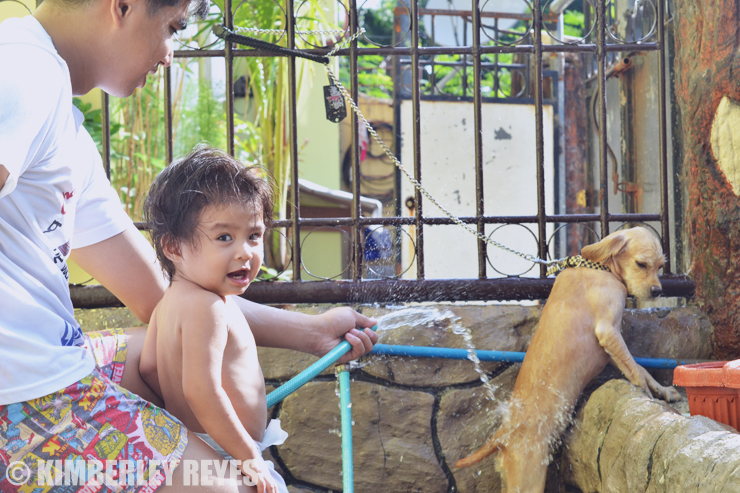
The weather has been crazy recently, right? It would be so hot one moment, then heavy rain would surprise us later on. While I love that we are finally getting some rain after a super hot summer, the not-so-nice thing about the onset of the rainy season is the illnesses that come with it. And the worst part is these illnesses almost always targets our little ones.
To help you, my fellow parents, prepare for rainy season, here’s a list of common rainy season illnesses that you should be ready to battle:
The common colds is a resident illness every rainy season. It starts with a sore throat and develops into a runny or stuffy nose coupled with a cough that starts by the fourth or fifth day. It’s very uncomfortable – especially for little ones – and lasts for about a week.
When your little one has a cold, note that the first three days are contagious. If he/she goes to school, it is best to keep him/her home during this time to avoid passing on the virus to other kids. While home, be sure to let the child rest and drink lots of water to help his/her body fight off the virus.
Note: A cold only lasts for a week. If it does not go away after a week, have your child checked by a pediatrician for allergies or sinusitis.
The Flu
The common colds and the flu have similar symptoms except with the flu, onset is really fast. Symptoms include sore throat, colds and cough, high fever, headache, and muscle pain. Like with the common colds, it is best to keep your little one home when he/she has the flu. Lots of rest, healthy food, and a good amount of water can help him/her recover. Be sure to have ibuprofen on hand in case of high fever.
The flu can last up to five days but expect your child to feel weak and run down even after a week.
Note: Do you notice shortness of breath or did your child’s fever come back after being gone for a day or two? One complication of the flu is pneumonia so when you notice these symptoms, have your little one checked right away!
Pneumonia
As I previously mentioned, pneumonia starts with upper respiratory tract infection. Some common symptoms you should look for are:
- Fever that comes back after two or three days of having none
- Chills
- Cough and nasal congestion
- Shortness of breath
- Wheezing sounds when breathing
- Vomiting
- Chest and abdominal pain
- Loss of appetite
When you suspect your child to have pneumonia, bring him/her to the doctor right away for treatment. Treatment usually lasts for 1 to 2 weeks. It is important to note that pneumonia is not contagious, but the upper respiratory viruses and bacteria that cause it are. It is still best to keep your child home until the doctor says it’s okay to go back to school.
Sounds serious? Well, you can prevent pneumonia through vaccines. Ask your pediatrician about it!
Dengue
Dengue is an infection carried by mosquitoes and is very common in tropical countries during the rainy season. It feels like the flu at first, but you later on notice other symptoms like rashes and bleeding.
I mentioned in my previous post that I suffered from dengue twice already. It is something I don’t want my kids to go through, which is why I am in complete war with mosquitoes that may be carrying the virus. Read more about my dengue prevention tips here.
Leptospirosis
We always hear this on the news, but what exactly is Leptospirosis? Leptospirosis is a bacteria transmitted by both wild and domestic animals. Symptoms include headaches, muscle pain, and fever. In severe cases, this disease cause bleeding of the lungs and meningitis.
How do you protect your child from this nasty illness? In the Philippines, Leptospirosis is commonly caught when the person walks on flood water with an open wound or comes in contact with an animal that has it. As much as possible, don’t let your child walk/play in flood water. Or, if you have no choice but to walk through it, it is best to wear protective gear like boots. It is also a must to thoroughly wash after possible contact.
Cholera
Cholera is an infection in the intestine that caught from drinking fluids or eating food that are contaminated with a bacteria called Vibrio cholerae. How does the bacteria get into the food? Brace yourself for this disgusting fact: People get cholera by drinking fluids or eating food that are contaminated with feces of someone who has cholera. D: Yucky!
This is why it is very important to thoroughly wash your hands after going to the bathroom – with or without cholera. Because really, it’s gross not to wash your hands!
Anyway. The symptoms of cholera include vomiting and diarrhea, which causes dehydration. Thankfully, though, cholera can be easily cured if treated early on. As soon as you notice these symptoms, be sure to bring your child to the doctor right away.
Healthy Parents, Healthy Kids!
Included in your efforts in protecting your child from these common rainy season illnesses is keeping yourself healthy as well. Be sure to eat a balanced diet, drink lots of water, and take vitamins so your body can fight off any illness that tries to get in. Also, don’t forget to carry an umbrella around – you know how unpredictable the rain is nowadays! 🙂
Do you have parenting tips on protecting your child from these common rainy season illnesses? I’d love to know! Share your tips in the comments section below.